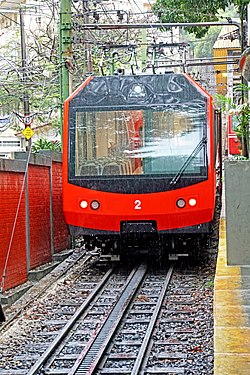Corcovado Rack Railway
| Corcovado Rack Railway | |||||||||||||||||||||||||||||||||||||||||||||||
|---|---|---|---|---|---|---|---|---|---|---|---|---|---|---|---|---|---|---|---|---|---|---|---|---|---|---|---|---|---|---|---|---|---|---|---|---|---|---|---|---|---|---|---|---|---|---|---|
 A Stadler train, photographed in 2019 | |||||||||||||||||||||||||||||||||||||||||||||||
| Overview | |||||||||||||||||||||||||||||||||||||||||||||||
| Status | Operating | ||||||||||||||||||||||||||||||||||||||||||||||
| Owner | |||||||||||||||||||||||||||||||||||||||||||||||
| Locale | Rio de Janeiro, Brazil | ||||||||||||||||||||||||||||||||||||||||||||||
| Termini | |||||||||||||||||||||||||||||||||||||||||||||||
| Stations | 4 active 1 closed | ||||||||||||||||||||||||||||||||||||||||||||||
| Service | |||||||||||||||||||||||||||||||||||||||||||||||
| Type | Rack railway | ||||||||||||||||||||||||||||||||||||||||||||||
| Operator(s) | Esfeco | ||||||||||||||||||||||||||||||||||||||||||||||
| History | |||||||||||||||||||||||||||||||||||||||||||||||
| Opened | 10 July 1884 | ||||||||||||||||||||||||||||||||||||||||||||||
| Technical | |||||||||||||||||||||||||||||||||||||||||||||||
| Line length | 3.8 km (2.36 mi) | ||||||||||||||||||||||||||||||||||||||||||||||
| Rack system | Riggenbach | ||||||||||||||||||||||||||||||||||||||||||||||
| Track gauge | 1,000 mm (3 ft 3+3⁄8 in) metre gauge | ||||||||||||||||||||||||||||||||||||||||||||||
| Minimum radius | 100 m (330 ft) | ||||||||||||||||||||||||||||||||||||||||||||||
| Electrification | Two three-phase 900 V AC 60 Hz overhead wires | ||||||||||||||||||||||||||||||||||||||||||||||
| Operating speed | 25 km/h (16 mph) | ||||||||||||||||||||||||||||||||||||||||||||||
| Highest elevation | 670 m (2,198 ft) | ||||||||||||||||||||||||||||||||||||||||||||||
| Maximum incline | 300‰ | ||||||||||||||||||||||||||||||||||||||||||||||
| |||||||||||||||||||||||||||||||||||||||||||||||
The Corcovado Rack Railway (Portuguese: Trem do Corcovado) is a mountain rack railway in Rio de Janeiro, Brazil, from Cosme Velho to the summit of Corcovado at an elevation of 710 m (2,329 ft). The summit is famous for its giant statue of Christ the Redeemer and for its views over the city and beaches.
History
[edit]

The railway was opened by Emperor Dom Pedro II of Brazil on 9 October 1884. Initially hauled by steam locomotives, the line was electrified in 1910, a first in Brazil. It was re-equipped in 1980[1] with trains built by Swiss Locomotive and Machine Works (SLM) of Winterthur, Switzerland, and these were in turn replaced in 2019[2] by vehicles from SLM's successor company Stadler Rail.
The line has been ridden by many famous people, including Pope Pius XII, Pope John Paul II, Alberto Santos-Dumont, Albert Einstein and Diana, Princess of Wales.[3]
Route and operation
[edit]

The line is 3.824 km (2.376 mi)[2] long and has four stations total. The termini are the historic base station in Cosme Velho and the summit of Corcovado.
The railway was built using metre gauge and the Riggenbach rack system, and has a maximum incline of 30%.[4] It is one of the few remaining railways using three-phase electric power with two overhead wires, at 900 V 60 Hz.
Passengers ride in custom-built electric multiple units (EMU) made by Stadler.[4] The vehicles, introduced in 2019, are capable of reaching a maximum speed of 25 km/h (16 mph), compared to the previous maximum of 15 km/h (9 mph), allowing the ascent to be made in about 15 minutes. During the descent, energy is recovered by regenerative braking, which leads to a saving of 75% of the overall power consumption.[5]

There are three trains,[2] each made of two cars.[4] The trip takes approximately 20 minutes and departs every 20 minutes, giving a capacity of 540 passengers per hour. Due to this limited capacity the wait at the entry station can be several hours. As of March 2021[update], the line operates from 08:00 to 19:00 (8 am to 7 pm).[6]).
References
[edit]- ^ "Estrada de Ferro do Corcovado". pell.portland.or.us. Retrieved 26 March 2021.
- ^ a b c "Novos trens do Corcovado começam a operar na próxima semana". O Globo (in Brazilian Portuguese). 2 October 2019. Retrieved 26 March 2021.
- ^ "Estrada de Ferro do Corcovado". 8 October 2006. Archived from the original on 8 October 2006. Retrieved 26 March 2021.
- ^ a b c Two-part rack-and-pinion multiple unit (PDF). Stadler Rail. Archived from the original (PDF) on 26 March 2021.
- ^ Stadler Rail in Brasilien: das Wunder von Rio de Janeiro
- ^ "Trem do Corcovado – General Information". tremdocorcovado.rio. Archived from the original on 28 December 2021. Retrieved 26 March 2021.
General reference
[edit]- Article "Rio de Janeiro: City of contrasts, quality metro" by C. J. Wansbeek, in Tramways & Urban Transit magazine, March 2005, published by the Light Rail Transit Association.


 French
French Deutsch
Deutsch